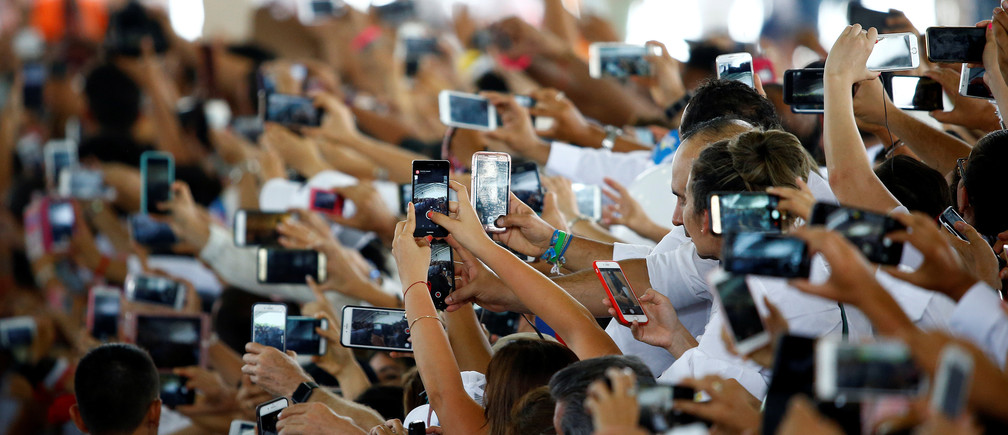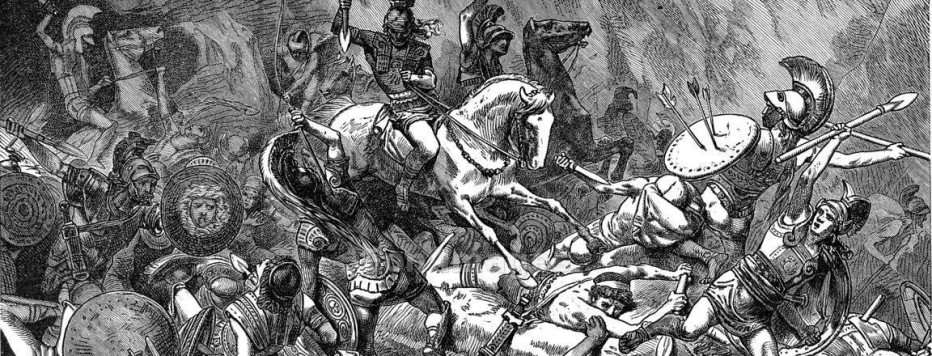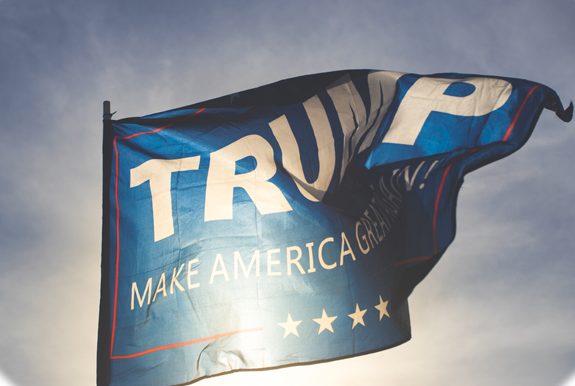Democracy and despotism in a digital age.
The Trump Phenomenon vs. The Successor Entity

Trump remains our reality because his enemies are trapped in a fantasy.
Professional political analysts are still trying to figure out why the Trump phenomenon has not petered out. To the contrary, it is in at least some respects stronger than ever, not only on the partisan front but the “intellectual” one too. Despite ever more effort on the part of Trump’s adversaries, and consistently little effort on the part of Trump to atone for his many political sins, victory still proves elusive to the “resistance.” The familiar dynamics of Trump’s opponents expecting over and over again to gain traction and momentum only to have it slip away from their grasp make it seem as if some alien entity has utterly transformed the political rules of the game.
Perhaps cognizant of how incapable they are of assessing the mysteries at the heart of their frustration, analysts who themselves feel a deep-seated antipathy toward Trump are inclined to focus their explanatory faculties on Trump’s supporters. Rather than seeking out what all today are ever more inclined to sniff on the wind—a structural account of Trump’s resilience and the persistence of his support—they instead seek to crack open the minds of Trump’s supporters and name and shame what lies within.
I would like to suggest what seems to me to be an obvious point, one Trump’s intelligent critics are especially resistant to considering. Whatever one’s partisan or ideological disposition, there are valuable reasons to seek a sociological understanding of how the expectations of the well-mobilized elite establishment have been dashed—over and over and over again, in a cycle of feverish hope, brittle certainty, shocking setback, and back to feverish hope—throughout its battle with Trump.
The Divine Ordination Thesis
There are a few ways someone sociologically inclined might begin to cut into this puzzle. One starting place was recently indicated by Boston College politics professor Ken Kersch, author of Conservatives and the Constitution: Imagining Constitutional Restoration in the Heyday of American Liberalism (2019), in a contribution to The Atlantic concerning “the overlooked conservative tradition that embraces an executive like Donald Trump.”
In looking beyond claims of transactional politics regarding Trump and his supporters, Kersch smartly seeks out the broader context of the relationship. Rather than zooming all the way up to the sociological level, however, he moves instead to political history—specifically, that of “a little-known but long-standing constitutional argument for an all-powerful, redemptive executive, one rooted in fundamental law and high principle, and one that has underwritten the thinking right’s steadfast support of this president.”
Kersch is wise to note the persistent, indeed renewed, influence of Professor Harry Jaffa’s “West Coast Straussian” emphasis on the necessity of maintaining a philosophical and political unity between the Declaration of Independence and the Constitution in order to preserve the justice of the American regime. But he rather oddly concludes that, just like the “Christian right,” the Claremont Institute has “arrived at an unshakable conviction” that Trump’s “role as a vindicating statesman and great president” has been “divinely ordained.”
It is hard not to interpret this as a tell—one with relevance to the sociological mystery of Trump’s continued strength and support. The “divine ordination” thesis offers major comfort and convenience to Trump’s adversaries by reducing support for Trump to a product of sheer supernatural devotion. This move turns Trump into a flying spaghetti monster—an absurd aberration to whom loyalty can only be pledged by delusional, irrational minds.
The conclusion is as immediate as it is simple, and, superficially, just as empowering: We are not dealing with people properly committed to normal, rational, legitimate politics. We are dealing not just with fanatics but fantasists!
Therefore, the only possible interpretation of the persistence of the Trump phenomenon is that people who in fact do know better have trumped their own reason with madness, embracing, as Kersch puts it, “a man who would have been the Founders’ worst nightmare, and the antithesis of every Christian or civic value and virtue that conservatives have purported to champion.”
Logically, another explanatory account of Trump supporters’ behavior is possible, but Kersch skirts it: perhaps the Trump phenomenon arises not from a perception that he is a savior who will restore our true moral vision, but from a perception that, (a), his adversaries are scourges who will impose false ethical delusions on America unless a large and solid enough manifestation of reality blocks them, and, (b), the only entity available right now that is large and solid enough to foster such a blocking effect is Trump.
True Religion
Let us map this possibility onto the reality of the Trump phenomenon. Instead of speculating about what the Trump phenomenon is for, let’s look at the concrete thing it is actually against. Beginning this way, we immediately encounter the biggest sociological story of the decade: the ideological and institutional fusion of human-resources corporatism, administrative progressivism, and militant wokeness into a single entity.
Analysts are still laboring mightily to hang a name around this entity that sticks; Wesley Yang, the author of The Souls of Yellow Folk (2018), has gotten some traction with “the successor ideology,” a deliberately vague moniker, with a deliberate sense of the functionary’s fussily totalitarian management-speak. Whatever we call it, we know perfectly well what it is. It is institutionalized, it is revolutionary, and it is in a state of high-grade panic over the Trump phenomenon.
Let’s leave aside the question of whether or not this entity poses various challenges to Christian morality and Christian life. One of the most interesting aspects of “the culture war” is the way in which Christians disagree on this question! But at this point in time there is no disagreement that this “successor” entity is fully engaged in what it sees as a decisive political battle to obliterate not just the Trump administration, but the American regime as we’ve known it. Transparently, aggressively, implacably, this is what the entity wishes; this defines its identity. All fall short of the glory of the woke corporatist administrative state; all must be dismantled to make way for its great advent. Why yes, this does seem a lot like religious, fantasist language. Intriguing!
The entity’s institutional revolutionaries, committed to replacing our current regime with the woke corporatist administrative state in full flower, understand that their aims are flatly unattainable with Trump in power. And a lot can happen in four years. The revolutionaries plainly see that these four years are especially significant to both their prospects and those of their adversaries. The revolutionaries know Trump’s reelection could result in more for them than additional setbacks: it seems to them that these four more years of Trump have the power to collapse their movement and end the opportunity to achieve their revolution.
The End of Television and the New World Order
But why? This is what goes mysteriously unsaid, unanalyzed, unthought. The entity’s institutional revolutionaries—just like usually more level-headed analysts like Kersch—are either unclear or in denial about why the stakes of this political conflict are so high and why its timeline is so compressed.
This fascinating state of cluelessness has great sociological significance. It is a master clue that points the way toward the solution to our sociological puzzle about the curious resilience and vitality of the Trump phenomenon. What Trump’s adversaries have such a hard time considering and processing, what is “unthinkable” to them, is that the Trump phenomenon is a manifestation of an inexorable, irreversible transformation in our lived reality.
This transformation, the evidence all around us strongly suggests, is not caused by rabble-rousing or extremist-coddling. It is not fomented by resurgent ideologies or intellectual crypto-conspiracies. It is caused by the replacement of the social, psychological, and technological environment that shaped Trump’s adversaries—a media environment they mastered so expertly that it became one with their form of political and cultural rule.
The character of this environment was decisively and definitively shaped by the television. It is impossible to make any sense of our current elite and its full mobilization against the Trump phenomenon without reference to their televisual identity. As demonstrated by the impeachment hearings and all the profoundly televisual battles against the Trump phenomenon that has led up to them, Trump’s adversaries are apex players in the televisual elite—committed to televisual rules of engagement, convinced of the power of televisual technology to cement their legitimate and authoritative rule, and totally incapable of accepting that the rise of digital technology has not just challenged but already obsolesced their entire lifeworld.
Viewed in this way, it becomes clear why Trump’s televisual adversaries, many of whom nominally understand and portray themselves as neutral rationalists simply defending the status quo, have become foxhole allies with the institutional revolutionaries of the successor entity. The “square” establishment and the “hip” revolutionaries are united in their televisual-era faith that the human imagination is the master source of truth, justice, and control. These are the fruits of the nation of the image America became in its TV-age supremacy. The hip and the square merely differ on the question of whether the current regime is adequate to delivering the goods of the human imagination to all.
No Going Back
For both the establishment and the revolutionaries, rationalism is good, but only insofar as it works as the servant of the right dreams, the proper kind of make-believe. That is why Obama’s memoir-writing staffers obsessively invoke The West Wing. That is why the constant tension between the hip and the square on the justice of the current regime returns again and again to battles over who “gets to” inculcate the ethically correct imaginings and broadcast the ethically mandatory visions.
Is or isn’t America suffused with the spectral malevolence of whiteness? Can or can’t a man transubstantiate himself into a woman simply by saying the magic words? Did or didn’t Epstein kill himself? Even with the existential threat of the Trump phenomenon to superficially unite them, the hip and the square incessantly struggle over who controls the official imagination of the successor entity.
But the rise of digital technology is replacing the televisual environment and its ruling elite with a new environment and a new elite—this time, defined not by the mastery of the human imagination but the mastery of machine memory. The triumph of digital means a few things, but one of the most basic is that imagination no longer defines us and our pecking order the way it once did. As a result, both the established imagineers and the revolutionary dream police are losing status, efficacy, and mind share, no matter how extreme or intense they become in their struggles to keep them. The televisual social environment that once put Trump’s future adversaries in unchallenged power is collapsing, and despite their use of the successor entity to wage in principle unlimited psychological war to defend their position, their underlying weakness cannot be concealed—even from themselves.
There is some debate over the degree to which the Trump phenomenon comprehends or reflects the uncompromising and accelerating character of the digital transformation taking place. But the Trump phenomenon does clearly demonstrate a widening recognition that the conceptual foundations of the successor entity—the legitimacy of the rule of expertly ethical imaginers—have already been destroyed by the digital changeover. Even more so than ideological commitments, what unites the participants in the Trump phenomenon is a perception that the successor entity is hostile to the new reality unfolding amid our newly digital world.
Yet Trump’s square adversaries evince no comprehension that their status quo can no longer be maintained, no matter how moderate or reasonable they strive to be; Trump’s hip adversaries, likewise, cannot countenance their loss of authority no matter how recondite, or ruthlessly enforced, their weaponized imaginings. In short, Trump’s establishment adversaries cannot successfully protect America’s regime, and his revolutionary adversaries cannot successfully replace it. Either road ends only in tears.
In this way, opponents of the Trump phenomenon will be unable to understand what is happening until they realize that their regime plans are so divorced from reality that, for millions of Americans, they are an instinctive deal breaker. The Trump phenomenon is not about the president’s supporters projecting a fantasy of divine ordination, but about the president’s opponents attempting to project the fantasy of their own ordination onto a re-surfaced reality that is no longer a screen.
In an age of commanding machines, the preservation of human excellence can no longer be entrusted to delusional imagineers. It belongs to those who grasp what is by nature human, and what in that nature must be enshrined within a just regime.
However great an act of retrieval such a transfer of power requires, it is plain that—wherever the Trump phenomenon leads—“there is no going back” to “the before times”. Whatever the ups and downs of the political fight over its aftermath, the fundamental change has been made. What the opponents of the Trump phenomenon imagine to be the decisive battle is already over.
The American Mind presents a range of perspectives. Views are writers’ own and do not necessarily represent those of The Claremont Institute.
The American Mind is a publication of the Claremont Institute, a non-profit 501(c)(3) organization, dedicated to restoring the principles of the American Founding to their rightful, preeminent authority in our national life. Interested in supporting our work? Gifts to the Claremont Institute are tax-deductible.
In 2010, Claremont Institute Senior Fellow Angelo Codevilla reintroduced the notion of "the ruling class" back into American popular discourse. In 2017, he described contemporary American politics as a "cold civil war." Now he applies the "logic of revolution" to our current political scene.
Claremont Institute Senior Fellow John Marini is one of the few experts on American Government who understood the rise of Trump from the beginning of the 2016 election cycle. Now he looks to the fundamental question that Trump's presidency raises: is the legitimacy of our political system based on the authority of the American people and the American nation-state, or the authority of experts and their technical knowledge in the service of "progress"?




